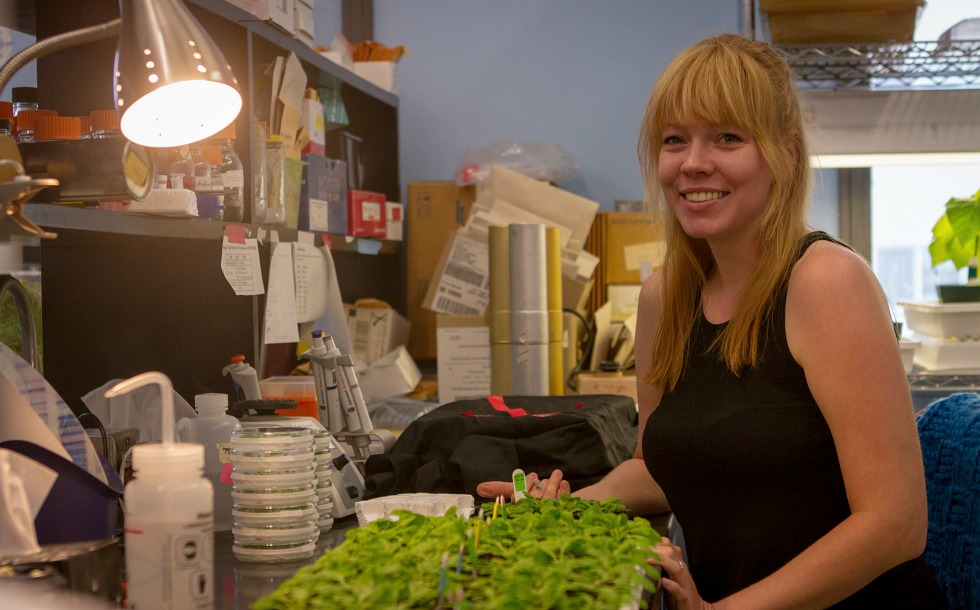Helping the garden grow: How one science grad found her calling

Recent science grad Christine Kempthorne in the Cameron Lab. After ten years as a successful computer consultant and web-designer, Kempthorne enrolled in McMaster's Life Sciences program where she discovered an unexpected passion for plants. Photo by: Sarah Janes.
In 2001, when Christine Kempthorne was in high school, she would never have predicted that 15 years later she’d be crossing the convocation stage at McMaster.
“Growing up, none of my peers went to university, most went right to work, into trades, or to college,” says Kempthorne. “To go to university was very intimidating, a big commitment, and a lot of money. I wasn’t ready to make the jump at the time.”
This week, Kempthorne is graduating with a Bachelor of Science from McMaster’s Honour Biochemistry program, the first in her family to receive a university degree.
“After high school, I thought I needed a job as quickly as possible,” says Kempthorne. So she enrolled in a one-year college program in computer science and spent the next ten years building her own successful business as a computer consultant and web-designer.
“Like every graduate, I was happy to be working, but at some point that wore off,” she says. “I decided to stop taking on new clients and focus on what I had always really enjoyed, which is science.”
In 2012 Kempthorne was accepted into McMaster’s Life Science Program. Her initial interest lay in forensic science and human pathology, “not because of CSI, because of actual interest,” she jokes. But to her surprise, by the end of her second year she discovered that plants were her real passion.
“I took Dr. Robin Cameron’s course on plants because I thought it would be easy,” laughs Kempthorne. “It turns out it was very challenging and very interesting. It was still along the lines of pathology and disease, but this time with plants instead of in animals and people.”
Her interest piqued, Kempthorne approached Cameron about volunteering in the Cameron Lab, where she became one of a handful of students contributing to research on how plants and crops respond to microbial infection, and where she eventually completed her fourth-year thesis.
“It’s a unique field and a developing field,” says Kempthorne whose research activities in the lab focused on pathogen resistance in the Brassica family of plants, which includes broccoli and cabbage. “I’m very interested in what’s happening in plants to make them more resistant to pathogens as they age, when the same pathogen would kill a younger plant.”
Although it took her a little longer, Kempthorne says she feels like she’s found her calling and, this May, started working on her master’s degree in the Cameron Lab.
Asked what insights she has for other students, her advice is to stay flexible and keep an open mind- an approach that has served Kempthorne well.
“In talking to undergraduates, I sometimes I forget they’re younger and there’s this fear that they’ve picked a career and they have to find a way to make it work,” says Kempthorne. “But they may find there’s something else they want to do. It’s ok to change your mind. Instead of trying force your choice on your life, let life influence your choice.”


